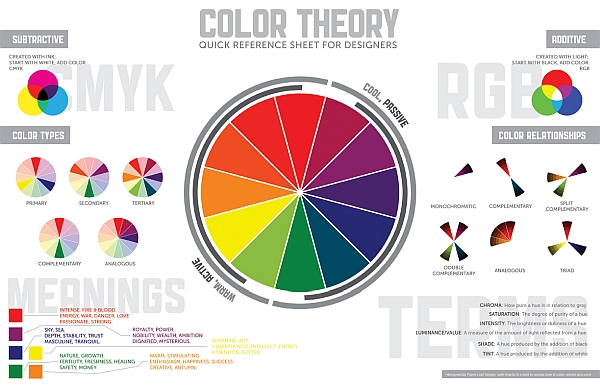The Psychology of Color on Marketing & Branding

The psychology of color sure is an interesting topic to learn about when trying to gasp how design affects your marketing strategies. And it is not just about web design we are talking about, but the choice of colors could affect the impact your product has over its target audience. From choosing the right color scheme for your product, from branding, the product itself (if edible, think about food products targeted to kids for example) or the colors used in the website that promotes the products. And that could be a critical phase for your product or service. If your only marketing alternative is online marketing, you don't want your prospect target audience to flee as soon as they glance at your welcome page or keep scrolling down their facebook home after passing your add.
Over at Entrepreneur Gregory Ciotti writes about how our usage of color strategies can help us to create content that persuades people to act. Of course it is not going to be as magical as if you were manipulating your costumers, but you could get close to it. As Gregory Ciotti puts it, is is not about triggering a reaction into people's minds, but rather allowing their subconscious minds to identify what is important, making smart choses about elements colors and how to highlight them over their surroundings. After all, it is not like the same color evokes the same reactions, feelings, or thoughts on every single person. Instead, you focus on how these color patters blend together to trigger the desired reaction into people, from making an attractive product to buy, making it easy for customers to contact you, to bait them into reading an article without trying their sight.
You don't need to be a expertise on the field of design, you only need to know the basics to create your basic common sense on what works and what doesn't. There are multiple sites that try to extensively teach us about the subject and many more that gives us a subtle glance of it. Each of them may help you build your own understanding and strategies on color selection whenever you may need to.
Entrepreneur: The Psychology of Color
Updated: I share with you a related link to an interesting reading about color theory.
http://cmoryl.com/2017/11/26/color-theory/
https://bl1ndf0ld.wordpress.com/2013/04/...fographic/
Over at Entrepreneur Gregory Ciotti writes about how our usage of color strategies can help us to create content that persuades people to act. Of course it is not going to be as magical as if you were manipulating your costumers, but you could get close to it. As Gregory Ciotti puts it, is is not about triggering a reaction into people's minds, but rather allowing their subconscious minds to identify what is important, making smart choses about elements colors and how to highlight them over their surroundings. After all, it is not like the same color evokes the same reactions, feelings, or thoughts on every single person. Instead, you focus on how these color patters blend together to trigger the desired reaction into people, from making an attractive product to buy, making it easy for customers to contact you, to bait them into reading an article without trying their sight.
You don't need to be a expertise on the field of design, you only need to know the basics to create your basic common sense on what works and what doesn't. There are multiple sites that try to extensively teach us about the subject and many more that gives us a subtle glance of it. Each of them may help you build your own understanding and strategies on color selection whenever you may need to.
Entrepreneur: The Psychology of Color
Updated: I share with you a related link to an interesting reading about color theory.
http://cmoryl.com/2017/11/26/color-theory/
https://bl1ndf0ld.wordpress.com/2013/04/...fographic/
![[Image: kol7k6n.jpg] [Image: kol7k6n.jpg]](http://i.imgur.com/kol7k6n.jpg)
![[Image: 8eCV85w.png] [Image: 8eCV85w.png]](http://i.imgur.com/8eCV85w.png)
![[Image: 8CNYrE7.jpg] [Image: 8CNYrE7.jpg]](http://i.imgur.com/8CNYrE7.jpg)
![[Image: IdKZIAG.jpg] [Image: IdKZIAG.jpg]](http://i.imgur.com/IdKZIAG.jpg)